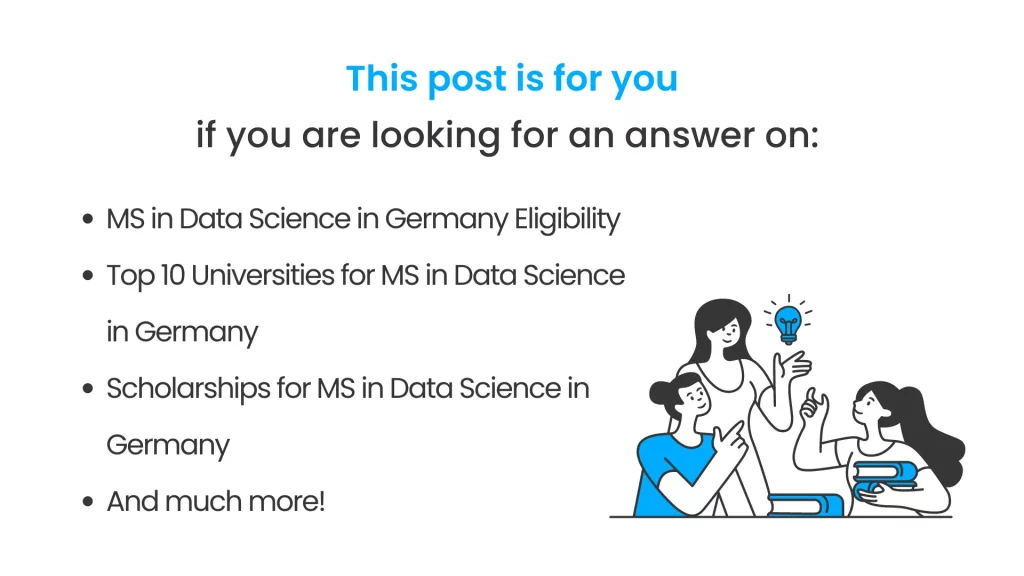In this technological world, data science has become an integral part of all industries. An interdisciplinary field, including the disciplines of mathematics, statistics, and computer science, data science is the most sought-after graduate program today. While many universities, especially in the US, are updating their course offerings to include graduates in data science programs, a Master’s in Data Science in Germany is one of the best choices.
Did you know?
The amount of training in Germany is quite high. A recent survey shows that 60% of international students studying in Germany want to stay after graduation.
A country is known for its technical and technological advancements. From top-notch laboratories, world-class study programs, and experienced faculty to exciting internships and employment opportunities. German universities offer the best opportunities for students seeking a master’s degree in data science. By learning advanced technologies in such a highly developed environment, you can take on roles in big data analytics, data science, data visualization, cloud computing, machine learning, ethical hacking, statistical analysis, and the like.
Topics covered
What all is covered in this post?
To make it easier for you, we have created a quick guide to everything you need to know about masters in data science in Germany.

Why study master’s in Data science in Germany?
Germany is a popular destination for international students due to its strong education system, affordable tuition, and diverse cultural experiences. Studying in Germany can be a great opportunity for those looking to further their education and advance their careers.

There are several reasons why pursuing a Master’s in Data Science in Germany might be a good choice:
- Strong education system: Germany is known for its high-quality education system, which can provide a strong foundation for a career in data science.
- Research opportunities: Germany is home to many top research institutions and companies, which can provide opportunities for students to work on cutting-edge projects and gain valuable experience in their field.
- Job prospects: The demand for data scientists is high in Germany, and a degree from a German institution can make you more competitive in the job market.
- Low cost of living: Germany is known for having a lower cost of living compared to other countries in Europe, which can make it more affordable for students to live and study there.
- Cultural experiences: Germany is a vibrant and diverse country with a rich cultural history, which can provide a rewarding and enriching experience for students studying there.
MS in data science in Germany eligibility
Eligibility requirements for a Master’s in Data Science program in Germany can vary depending on the specific program and institution. However, there are some general requirements that are typically expected of applicants:
- Bachelor’s degree: Most programs will require applicants to have completed a Bachelor’s degree in a related field. These fields could be computer science, statistics, mathematics, or engineering.
- Language proficiency: Many programs will require applicants to demonstrate proficiency in English, as the language of instruction is typically English. This can be done through exams such as TOEFL or IELTS.
- GPA: Most programs will have a minimum GPA requirement, typically around a 3.0 or 3.5 on a 4.0 scale.
It’s important to note that these are just general requirements and specific programs may have additional or more specific requirements. It’s always a good idea to check with the specific program and institution to confirm their requirements.
Documents required
Here are some of the documents that are required to study MS in Data Science in Germany:
- Academic Transcripts
- Cover letter (similar to a statement of purpose)
- Updated CV
- Proof of language proficiency (e.g., IELTS or TOEFL for English; DSH for German)
- Letters of recommendation
- Germany blocked account
- Recent photos and a copy of your Germany student visa
- Evaluation of uni-assist bachelor’s certificates for a degree obtained in a country outside the EU/EEA
Top 10 universities for MS in Data Science in Germany
German universities offer a 2-year MS in Data Science program. This program is spread over four semesters. With a master’s degree in data science in Germany, you can get a high-paying job in companies like Apple, Walmart, Accenture, Oracle, IBM, Bank of America, etc. Among the colleges that offer a master’s degree in data science in Germany is the Technical University of Munich. It is in the top 50 of the world’s ranking of schools.
Here is a summary list of the best colleges for an MS in data science in Germany along with the popular programs and tuition fees:
| University | Program | Tuition Fee (EUR) |
| Technical University of Munich | MS in Data Science (Mathematics) | 608 |
| Ludwig Maximilians Universität | MS in Data Science | 1,392 |
| Freie Universität Berlin | MS in Data Science | 1,248 |
| RWTH Aachen University | MS in Data Science | 1,240 |
| Eberhard Karls Universität Tübingen | MS in Data Science (Business and Economics) MS in Quantitative Data Science | 6,000 |
| University of Gottingen | MS in Applied Data Science | 1,600 |
| University of Mannheim | MS in Data Science | 6,000 |
Cost of studying masters in Data Science in Germany
The cost of studying for a master’s degree in data science in Germany can vary depending on several factors. These factors could be the institution, the duration of the program, or whether you are an international or a domestic student.
Generally, tuition fees for a master’s degree in data science at a public university in Germany range from 0 to 10,000 euros per year for domestic students, and from 5,000 to 30,000 euros per year for international students or Indian students. Some private universities may charge higher fees.
In addition to tuition fees, you should also consider other costs associated with studying in Germany, such as accommodation, living expenses, health insurance, and travel costs. These costs can vary depending on your location and lifestyle, but you should expect to budget at least 800 to 1,000 euros per month to cover these expenses.
It is worth noting that many universities in Germany offer scholarships and other forms of financial assistance to help students cover the costs of their studies. You can also consider working part-time or applying for a student loan to help finance your studies.
Also, read: Study in Latvia
Scholarships for MS in Data Science in Germany
There are various scholarship options available for students who are interested in pursuing a master’s degree in data science in Germany. Some of the options you might consider include:
| Scholarship | Award |
| DAAD Scholarships | 850 EUR for PG students |
| DeutschlandStipendium National Scholarship Programme | 300 EUR per month |
| Heinrich Boll Foundation Scholarship | 850 EUR per month + tuition fees |
| Konrad-Adenauer-Stiftung Scholarships | 1,200 EUR for Doctoral students |
It is worth noting that scholarship availability and eligibility requirements can vary, so it is important to do your research and apply early to increase your chances of being awarded a scholarship.
Career after the master’s in Data Science in Germany
By 2026, an additional 11.5 million jobs will be created due to the growing need for data scientists and a shortage of skilled professionals in the field. According to research by LinkedIn, data science is the most in-demand computer science field. Every year, the demand for data-driven employment increases by 14-18%. In Germany, a master’s degree in data science has a wide range of applications and offers many high-paying job prospects. According to research, a master’s degree in data science typically costs more than $18,000 more than a bachelor’s degree. While entry-level positions pay an average of €55,000 per year, senior positions with management and team leadership experience earn an average of €1,000,000.
Here are some of the promising job profiles for data science graduates in Germany along with Salary in EURO:
- Business Intelligence Manager – 85,000
- Data Scientist – 110,000
- Director of Analytics – 98,000
- Information Security Manager – 87,000
- Senior Database Administrator – 123,00
It’s a wrap!
In addition to increasing your career potential, earning a master’s degree in data analysis has many benefits. You can gain professional and personal skills from them to accelerate your future career growth. They allow you to stand out from your contemporaries, many of whom will have comparable A-level and undergraduate credentials. In addition, the standards of the education system in Germany are very high.
An MSc in data analytics is a great way to advance your career in this expanding sector, whether you’re already working in a data analytics role or trying to change careers. If you still have queries, do dial us up! iDreamCareer is on a mission to reach every state and every child in order to ensure that talent is appropriately delivered to the industry.
We’ve helped a few brilliant but confused minds to choose the most suitable career for them. Hear the success story of Tapan, who received an offer from a top 4 university and is now attending DePauw University after receiving career guidance from our study abroad experts!
FAQs
A Master’s in Data Science program in Germany is a postgraduate degree that teaches advanced techniques and theories in data analysis and machine learning.
Admission requirements for a Master’s in Data Science program in Germany vary by university and program but typically include a bachelor’s degree in a related field and a strong background in programming and math.
A Master’s in Data Science program in Germany typically takes two years to complete.
The cost of a Master’s in Data Science program in Germany varies, but tuition fees can range from around €1,500 to €20,000 per year, in addition to living expenses.
Upon completion of a Master’s in Data Science program in Germany, graduates may pursue careers in data analysis, machine learning, and data visualization in a variety of industries.

Anushree Rastogi is a Senior Content Writer at iDreamCareer, bringing over 5 years of expertise to the field of career counseling. She has done a PGDM in Marketing and Finance and possesses a unique blend of skills that allows her to craft engaging and informative content. She is passionate about helping individuals navigate their career paths and has dedicated her career to providing valuable insights through her content. Her commitment to excellence and keen understanding of the career landscape make her a trusted guide for those seeking professional direction. With a flair for clear and engaging writing, Anushree is on a mission to empower others to make informed and fulfilling career choices.












